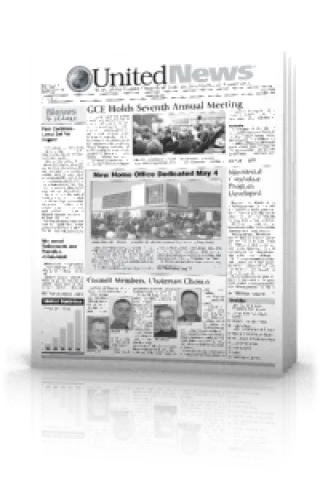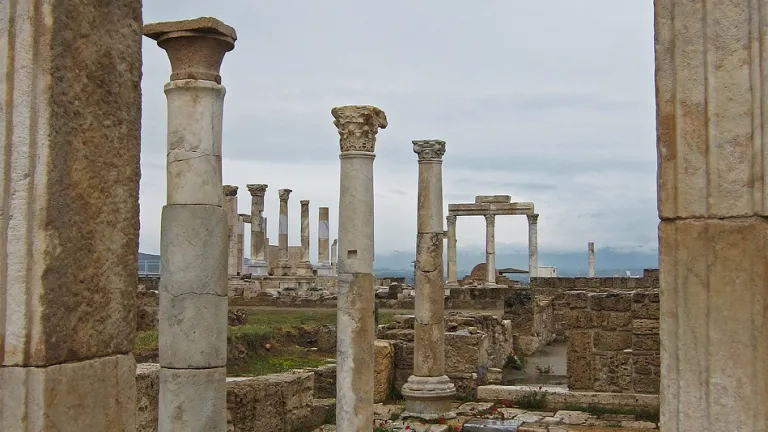Message to Pergamos and Thyatira: Don't Compromise

Christ's warning about compromise remains an important lesson for God's people today.
In continuing our study of Jesus Christ's messages to His people recorded in Revelation 2 and 3, we now consider the two first-century cities of Pergamos and Thyatira. We will examine these two together because they were given the same basic message. Both had members who gave in to the same sin. The influence, or negative peer pressure, just came from different segments of society.
Pergamos, or Pergamum as it is also called, was "the chief city of Mysia, near the Caicus River in northwest Asia Minor (modern Turkey)... The city, situated opposite the island of Lesbos, was about 24 kilometers (15 miles) from the Aegean Sea.
"In its early history Pergamos became a city-state, then a powerful nation after Attalus I (241-197 B.C.) defeated the Gauls (Galatians). It stood as a symbol of Greek superiority over the barbarians. Great buildings were erected and a library containing over 200,000 items was established. The Egyptians, concerned with this library which rivaled their own at Alexandria, refused to ship papyrus to Pergamos. As a result, a new form of writing material, Pergamena charta, or parchment, was developed.
"In the days of Roman dominance throughout Asia Minor, Pergamos became the capital of the Roman province of Asia. In a gesture of friendship, Mark Antony gave Pergamos' library to Cleopatra; its volumes were moved to Alexandria.
"Not only was Pergamos a government center with three imperial temples, but it was also the site of the temple of Asklepios (the Greco-Roman god of medicine and healing), and the medical center where the physician Galen worked (about A.D. 160). Here also was a temple to Athena and a temple to Zeus with an altar showing Zeus defeating snake-like giants. In the Book of Revelation, John spoke of Pergamos as the place 'where Satan's throne is' (Rev. 2:13). This could be a reference to the cult of emperor worship, because Pergamos was a center where this form of loyalty was pledged to the emperor of the Roman Empire" (Nelson's Illustrated Bible Dictionary, 1986, Thomas Nelson Publishers, "Pergamos").
Another source adds, "The city was greatly addicted to idolatry, and its grove, which was one of the wonders of the place, was filled with statues and altars... The wealth of the Attalic princes had raised Pergamum to the rank of the first city in Asia as regards splendor. It was a sort of union of a pagan cathedral city, a university town, and a royal residence, embellished during a succession of years by kings who all had a passion for expenditure and ample means of gratifying it... Systematic study of Pergamum began in 1878 after the German engineer Carl Human (now buried on the Pergamum acropolis) discovered the great altar of Zeus (believed by some to be Satan's seat, Rev. 2:13), now in East Berlin" (New Unger's Bible Dictionary, 1988, "Pergamum").
As for religions: "There were beautiful temples to the four great gods Zeus, Dionysus, Athena and Asklepios. To the temple of the latter, invalids from all parts of Asia flocked, and there, while they were sleeping in the court, the god revealed to the priests and physicians by means of dreams the remedies which were necessary to heal their maladies. Thus opportunities of deception were numerous. There was a school of medicine in connection with the temple. Pergamos was chiefly a religious center of the province. A title which it bore was 'Thrice Neokoros,' meaning that in the city 3 temples had been built to the Roman emperors, in which the emperors were worshipped as gods. Smyrna, a rival city, was a commercial center, and as it increased in wealth, it gradually became the political center. Later, when it became the capital, Pergamos remained the religious center" (International Standard Bible Encylopaedia, 1996, Biblesoft, "Pergamos; Pergamum").
To briefly describe Pergamos, we could call it a large governmental, religious and medical center. It represented education and government. Thyatira, by contrast, was much smaller. Made up of businesses, it was a working person's town.
Thyatira
This city was in "the province of Lydia in western Asia Minor (modern Turkey) situated on the road from Pergamos to Sardis. The city was on the southern bank of the Lycus River, a branch of the Hermus River.
"Although never a large city, Thyatira was a thriving manufacturing and commercial center during New Testament times. Archaeologists have uncovered evidence of many trade guilds and unions here. Membership in these trade guilds, necessary for financial and social success, often involved pagan customs and practices such as superstitious worship, union feasts using food sacrificed to pagan gods, and loose sexual morality.
"The Book of Revelation refers to a certain woman known as 'Jezebel' who taught and beguiled the Christians at Thyatira to conform to the paganism and sexual immorality of their surroundings (Rev. 1:11; 2:18-29). In the church in Thyatira, one of the 'seven churches which are in Asia' (Rev. 1:4), Jezebel's followers seem to have been a minority because the majority of Christians in this church are commended.
"The apostle Paul's first convert in Europe was 'a certain woman named Lydia…a seller of purple from the city of Thyatira' (Acts 16:14). The modern name of Thyatira is Akhisar, which means 'white castle'" (Nelson's Illustrated Bible Dictionary, 1986, Thomas Nelson Publishers, "Thyatira").
Their Common Problem
Though Pergamos and Thyatira differed in many respects (large city versus small city, educational center versus business center, high society versus trade unions), the Christians in both congregations faced insidious influences to compromise their beliefs in order to fit in with the societies around them. When members gave in to these pressures, they committed the same sins: eating "things sacrificed to idols" and committing "sexual immorality" (Revelation 2:14, 20).
In order to emphasize the point that Christians must be careful not to sin through compromise, Jesus used two Old Testament examples of people who compromised God's instructions and a New Testament group that did the same. The individuals were Balaam and Jezebel; the group, the Nicolaitans.
Balaam
This Old Testament figure was "the son of Beor of Pethor of Mesopotamia" (Deuteronomy 23:4). His name, Balaam, "can mean to 'conquer the people' (Heb. Ba'al'am), which means the same as 'Nicolaitans,' and since they are mentioned together in this letter [Revelation], both groups may be closely related" (Expositor's Bible Commentary of the New Testament).
During the time of Moses, Balak, king of Moab, observed the Israelites' wanderings in the wilderness. After noting the destruction of several armies that attacked them, Balak became concerned about this threat to his nation. He then tried to hire Balaam to curse the Israelites (Numbers 22:1-6). Because the king had observed that those Balaam blessed were blessed and those he cursed were cursed, he sent elders of Moab and Midian to Balaam with a "diviner's fee" to pay for the curse (verses 6-7).
Upon learning of Balak's offer, Balaam seemed willing to make the deal. But there was one problem—God told Balaam that he couldn't go with the elders or curse Israel (verses 7-14). After explaining that God wouldn't let him go with them, the emissaries returned to Balak. The king then sent another party of even higher officials to Balaam and offered to let Balaam set his own price for cursing Israel (verses 15-17). Balaam invited this group to spend the night while he again conferred with God.
"And God came to Balaam at night and said to him, 'If the men come to call you, rise and go with them; but only the word which I speak to you—that you shall do.' So Balaam rose in the morning, saddled his donkey, and went with the princes of Moab" (verses 20-21). Sadly, Balaam didn't wait to be invited. He was so greedy for "the wages of unrighteousness" (2 Peter 2:15), he was willing to compromise God's explicit instructions.
In his own mind, Balaam probably reasoned that God had given him permission to go. But God was not pleased with Balaam's presumptuous action. "Then God's anger was aroused because he went, and the Angel of the Lord took His stand in the way as an adversary against him. And he was riding on his donkey, and his two servants were with him" (verse 22).
Ironically, God allowed Balaam's donkey to see the danger, but not Balaam himself. Even though the donkey saved Balaam's life three times, Balaam became so upset with his animal that he was ready to kill her. God then allowed the donkey to speak and soon she and Balaam were in a conversation about what had transpired (verses 22-30).
"Then the Lord opened Balaam's eyes, and he saw the Angel of the Lord standing in the way with His drawn sword in His hand; and he bowed his head and fell flat on his face. And the Angel of the Lord said to him, 'Why have you struck your donkey these three times? Behold, I have come out to stand against you, because your way is perverse before Me. The donkey saw Me and turned aside from Me these three times. If she had not turned aside from Me, surely I would also have killed you by now, and let her live.' And Balaam said to the Angel of the Lord, 'I have sinned, for I did not know You stood in the way against me. Now therefore, if it displeases You, I will turn back'" (verses 31-34).
Apparently humbled, God allowed Balaam to continue with the entourage. Though Balak then took Balaam to several vantage points from which he hoped Balaam would curse Israel, Balaam refused to do so (Numbers 22:41 to Numbers 24). Instead, as God instructed, Balaam blessed Israel.
Unfortunately, Balaam's willingness to follow God's instructions soon waned. As this account eventually concludes, Balaam once again presumptuously compromised God's instructions. Since God wouldn't allow Balaam to directly curse Israel, Balaam gave Balak advice that would lead to the same result: encourage the women of Moab to invite the Israelite men to their sacrifices to Baal-peor and the sexual immorality associated with this pagan religion. When the men of Israel sinned in this way, God punished them Himself (Numbers 25:1-3; 31:16).
The sin of Balaam was compromising God's instructions. Compromise also led some at Pergamos and Thyatira to commit the same sins as the ancient Israelites. As for their mention in Revelation 2, the Expositor's Bible Commentary of the New Testament says, "The combination of 'food sacrificed to idols' with 'sexual immorality' may refer to the common practice of participating in the sacrificial meal of the pagan gods (cf. 1 Cor. 10:19-22) and indulging in sexual intercourse with temple priestesses in cult prostitution.
"This is the more normal way to understand the term 'sexual immorality' in the context of the pagan gods. Some feel, however, that the term refers to spiritual unfaithfulness and apostasy from Christ (cf. Isa. 1:21; Ezek. 23:37). But the prevalence of sexual immorality in first-century pagan society makes it entirely possible that some Christians at Pergamum were still participating in the holiday festivities and saw no wrong in indulging in the 'harmless' table in the temples and the sexual excitement everyone else was enjoying (cf. 1 John 5:21)."
Jezebel
This notorious woman of the Old Testament was the Canaanite wife of Israel's King Ahab. She had not only led Ahab to worship Baal, but through her husband had promulgated her teachings of idolatry and witchcraft throughout all Israel (1 Kings 16:31-34; 2 Kings 9:22).
In addressing the church at Thyatira, Jesus used this same name to refer to a contemporary woman apparently following the example of this Old Testament queen. As the International Standard Bible Encylopaedia explains, "In Rev. 2:20, we read of Iezabel [sic], 'the woman Jezebel, who calleth herself a prophetess'... as Moffat (Expositor's Greek Testament) aptly renders, 'that Jezebel of a woman alleging herself a prophetess.'
"Some members of the church at Thyatira 'under the sway of an influential woman refused to separate from the local guilds where moral interests, though not ostensibly defied, were often seriously compromised... Her lax principles or tendencies made for a connection with foreign and compromising associations which evidently exerted a dangerous influence upon some weaker Christians in the city.' Her followers 'prided themselves upon their enlightened liberalism (verse 24)'" (Electronic Database, 1996, Biblesoft, "Jezebel").
Just how did this woman beguile or seduce (Revelation 2:20) some Christians at Thyatira to commit sexual immorality and eat things sacrificed to idols? A number of biblical resources suggest that this first-century Jezebel's teaching was similar to that of the Balaamites and Nicolaitans. Yet hers may have centered upon knowing "the depths of Satan" (verse 24).
The Expositor's Bible Commentary says, "But could she lure Christians by using such a term? The reasoning of some in the early church (the Nicolaitans) might have gone something like this: The only effective way to confront Satan was to enter into his strongholds; the real nature of sin could only be learned by experience, and therefore only those who had really experienced sin could truly appreciate grace. So by experiencing the depths of paganism ('the deep secrets of Satan'), one would better be equipped to serve Christ, or be an example of freedom to his brothers (cf. 1 Cor. 8:9-11). Thus the sin of Jezebel was deadly serious because of the depths of its deception. Only a few perceived where the teaching was leading."
Nicolaitans
Though little is known about this group, it seems to have embraced the same compromising approach as the Balaamites and followers of Jezebel. While the Ephesians recognized the Nicolaitan error (Revelation 2:6), apparently some in Pergamos and Thyatira were deceived by it.
Nelson's Illustrated Bible Dictionary says the Nicolaitans were "an early Christian heretical sect made up of followers of Nicolas, who was possibly the deacon of Acts 6:5. The group is mentioned explicitly only in Rev. 2:6, 14-15, where it is equated with a group holding 'the doctrine of Balaam,' who taught Israel 'to eat things sacrificed to idols, and to commit sexual immorality.'
"Balaam probably was responsible for the cohabitation of the men of Israel with the women of Moab (Num. 25:1-2; 31:16). Therefore, the error of this group was moral rather than doctrinal. If the 'Jezebel' of Revelation 2:20-23 was a teacher of this sect, as many believe, their sexual laxity was indeed strong. Most likely, they were a group of anti-law practitioners who supported a freedom that became self-indulgence. It may have been the same heresy condemned in 2 Peter 2:15 and Jude 11. Some early church leaders believed the Nicolaitans later became a gnostic sect" (Electronic database, 1986, Thomas Nelson Publishers, "Nicolaitans").
Fear
Occasionally the people of God find themselves compromising because of fear. A couple of examples from the lives of Abraham and his son, Isaac, vividly illustrate this problem.
Before Abram's and Sarai's names were changed to Abraham and Sarah, they went to Egypt because of a severe famine (Genesis 12:10). While there, Abraham asked his wife to say that she was his sister because he was afraid someone might kill him in order to have his wife (verses 11-13). In time, Pharaoh took Sarai into his house with the likely intent of making her his wife (verses 14-16). When this occurred, "the Lord plagued Pharaoh and his house with great plagues because of Sarai, Abram's wife" (verse 17). Eventually, Pharoah learned Sarai was Abram's wife and returned her to him (verses 18-20).
Years later, Abraham told the same story to Abimelech, king of Gerar (Genesis 20:1-2). Again, God delivered Abraham and Sarah, but this time, Abimelech asked Abraham why he had said Sarah was his sister (verses 3-10). Abraham then explained: "Because I thought, surely the fear of God is not in this place; and they will kill me on account of my wife. But indeed she is truly my sister. She is the daughter of my father, but not the daughter of my mother; and she became my wife. And it came to pass, when God caused me to wander from my father's house, that I said to her, 'This is your kindness that you should do for me: in every place, wherever we go, say of me, "He is my brother"'" (verses 11-13).
Even though God had previously shown Abraham and Sarah that He would protect them, fear caused Abraham to once again employ his half-truth that Sarah was his sister. Sadly, Abraham's example also influenced Isaac. When Isaac faced a similar situation with his wife, Rebekah, he used the same explanation as his father (Genesis 26:6-11). In Isaac's case, however, it wasn't even a half-truth. It was a lie—a completely untrue statement motivated by fear.
In Revelation 21:8, Jesus Christ warns us that "the cowardly ["fearful," KJV], unbelieving, abominable, murderers, sexually immoral, sorcerers, idolaters, and all liars shall have their part in the lake which burns with fire and brimstone, which is the second death." Whether motivated by fear or not, liars will not be in the Kingdom, nor will the sexually immoral. Compromising God's instructions is not the path to eternal life.
Antidotes
One of the great antidotes to fear is the love of God. As the apostle John explains, "There is no fear in love; but perfect love casts out fear" (1 John 4:18). When we deeply commit ourselves to God and love Him more than anything else, God will help us have the courage we need to serve Him without compromise.
And finally, there is the other great remedy to compromise that Jesus spoke of in His message to Pergamos and Thyatira. To those who had entered the dangerous waters of compromise, He simply said, "repent" (verses 16, 21). If we discover that we have compromised God's instructions, we must also change.
When King David acknowledged his adultery with Bathsheba and murder of Uriah, he deeply repented before God (Psalm 51:1-12). We can do the same. Remember God's eternal message to His people: don't compromise His instructions.






